No, Norwich Terriers are not soft because of their wiry and dense outer coat. Their coat is coarser and rougher to the touch, which helps protect them from the elements and gives them their characteristic rugged appearance. However, beneath their outer coat, they have a softer undercoat that provides insulation and warmth.
Norwich Terrier
Breed Type: Terrier
Common nicknames: Norwich
Coat: Wiry, double
Hypoallergenic: No, they will likely trigger allergies.
Temperament: Energetic, outgoing, affectionate, playful
Life expectancy: 12-15 years
Color & patterns: Wheaten

The Norwich Terrier is a lively and spunky breed that will brighten your life with endless laughter and love. With their small size and compact builds, these energetic companions are always ready for an adventure. Norwich Terriers are known for their playful and outgoing natures, boundless energy, and feistiness, making them excellent pups for active individuals, families, and other pets.
Norwich Terrier characteristics
Learn about about Norwich Terrier basics like their fur colors, shedding levels, how much grooming they need, and other Norwich Terrier facts.
Average height
10-11 inches (25.4-27.9cm)
Average weight
8-17 pounds (3.6-7.7 kg)
Average lifespan
12-15 years
Exercise needs
Grooming needs
Full-grown size
Good with cats
Good with kids
Training Aptitude
Do Norwich Terriers shed?
Yes, Norwich Terriers shed, but minimally. Their wiry outer coat and dense undercoat are low shedding compared to breeds with finer or thicker coats.
To keep shedding to a minimum, once-weekly brushing is essential. This helps remove loose hair and prevents it from accumulating around the home. Brushing also stimulates the natural oils in their coat, promoting healthy skin and fur. Many Norwich Terrier pet parents find that a slicker brush or a pin brush works well to reach through their wiry coat and keep it tangle-free.
Additionally, grooming should include periodic hand-stripping or clipping of their coat to maintain its texture and shape. Hand-stripping is a painless practice that involves removing loose, dead hairs by hand to encourage new growth and preserve the distinctive wiry texture of their coat. This method can be done every few months, depending on the individual dog and their coat condition.
What colors do Norwich Terriers come in?
Norwich Terriers, according to American Kennel Club standards, come in four accepted colors: red, wheaten, black and tan, and grizzle (which includes various shades of tan and red with black hairs interspersed, creating a “pepper and salt” appearance).
Deviation from these colors can be considered a fault in the breed standard. For instance, colors such as solid black, solid white, or blue (a diluted black) are generally considered deviations and may not meet the breed standard for showing purposes. White markings are discouraged. Additionally, any colors or markings that obscure the Norwich Terrier’s characteristic facial expression are considered faults.
Of course, deviations from the accepted coat color and markings don’t affect the Norwich Terrier’s health or devalue them as an individual or canine companion. Ultimately, what matters most in the relationship between a dog and their person is the bond they share and the mutual love and companionship they provide to each other, regardless of appearance.
How big are Norwich Terriers?
Norwich Terriers are small-sized dogs. Adult males and females typically weigh around 12 pounds and stand up to 10 inches tall at the shoulders. They are compact and sturdy dogs, similar in size to other small terrier breeds such as Cairn Terriers and Norfolk Terriers.
Several factors can influence the size of your Norwich Terrier. Genetics play a significant role, as dogs from larger or smaller parents may inherit their size traits accordingly. Nutrition during growth stages also impacts their size and overall health. It’s important to feed small-breed puppy food until they are six to eight months old, as this diet is formulated to support healthy and balanced development.
When is a Norwich Terrier fully grown?
Norwich Terriers are fully grown at about 12 months old. They typically reach their full height by eight months and then continue to fill out and develop muscle mass until their first birthday. To help them grow healthy and strong, it’s important to provide them with a small-breed, balanced diet suited to their age, support their development with moderate exercise without overloading their growing bones, and schedule routine checkups to catch and treat any health issues early on.
Do Norwich Terriers hunt birds?
No, Norwich Terriers do not hunt birds and were primarily bred for hunting small vermin such as rats and mice. Historically, their main role was to control rodent populations and assist in hunting by flushing out foxes from dens. While they have a strong prey drive and can exhibit interest in chasing smaller animals, including birds, they are not typically associated with bird hunting historically or in the present day.
How long do Norwich Terriers live?
Norwich Terriers typically live between 12 to 15 years. Their longevity can be influenced by factors such as a healthy diet, moderate exercise, regular veterinary care, and a loving, stress-free environment. Proper nutrition and routine check-ups help catch potential health issues early while keeping them active ensures they stay fit and healthy. Genetics also play a crucial role, as dogs from healthy lineages tend to have fewer inherited health problems. The Norwich Terrier’s lifespan is comparable to those of similar breeds, such as Cairn Terriers, Norfolk Terriers, and Yorkshire Terriers.
Norwich Terrier history
Learn about where this Norwich Terrier came from!
Where are Norwich Terriers from?
Norwich Terriers are from the city of Norwich in the county of Norfolk, England. They were developed in the 1800s primarily to hunt small game on farms and stables. The breed also rose to prominence at Cambridge University in the 1870s and 1880s when having a Norwich Terrier as a pet and dorm ratter became a popular fad among undergraduates.
Norwich Terrier temperament
Learn about about the Norwich Terrier temperament and how well they fit into your lifestyle, home environment, and family.
Do Norwich Terriers bark a lot?
Yes, Norwich Terriers can bark a lot as they are prone to vocally alerting to sudden sounds or changes in their environment. Additionally, they may bark out of excitement, boredom, or to gain the attention of their pet parent.
To manage and prevent excessive barking, providing enrichment activities is essential. Engaging a dog’s mind with toys, puzzles, or training sessions helps channel their energy constructively and reduces boredom-induced barking. Daily exercise, such as walks or playtime and the opportunity to dig, not only burns off excess energy but also promotes mental and physical well-being, which can decrease the urge to bark excessively.
Ensuring Norwich Terriers get adequate restorative sleep is equally important. Like humans, dogs need sufficient sleep to recharge and maintain their overall health. A comfortable and quiet sleeping area, away from distractions, helps them relax and reduces stress levels, which in turn can contribute to quieter behavior throughout the day.
Are Norwich Terriers good with cats?
Yes, Norwich Terriers can be good with cats, although it’s imperative to socialize them well with kitties and reward calm interactions as they can be tempted to chase them. Their friendly and curious nature can lead to positive interactions with cats, but individual personalities, early socialization, and positive reinforcement training can play a significant role in how well they will coexist. While Norwich Terriers have a high prey drive, they tend to do better with cats than other small pets such as hamsters, gerbils, and rats.
When introducing a Norwich Terrier to a cat, start with scent-based introductions by exchanging bedding or using separate rooms with closed doors to allow them to get used to each other’s scent. Gradually introduce them in a controlled environment, using positive reinforcement such as treats for calm, friendly, and non-fixated behavior. Ensure the cat has escape routes and elevated perches where they can retreat if feeling overwhelmed, and supervise their interactions closely until they are comfortable with each other’s presence.
Are Norwich Terriers good with other dogs?
Yes, Norwich Terriers can be good with other dogs, especially when they have been properly socialized and introduced from a young age. Their friendly, bold, and sociable nature often makes them eager to interact and play with other dogs.
However, like any breed, individual temperament plays a significant role, so some Norwich Terriers may prefer certain playmates or personalities over others. As a small-breed pup, it’s crucial to make sure they feel safe and secure in their interactions with larger dogs, as insecurity can lead to defensive behaviors.
When introducing Norwich Terriers to new dogs, it’s helpful to start in controlled environments like on leash walks or in neutral territory, allowing them to get used to each other gradually. Keeping a close eye on their interactions ensures that play stays safe and enjoyable. Using positive reinforcement for calm behavior reinforces their social skills and encourages positive interactions with other dogs as they continue to socialize. If your pup seems uncomfortable with an interaction, it’s best to provide comfort and increase distance from the other pup, allowing them to process the other dog from a distance where they feel safe.
Are Norwich Terriers easy to train?
Yes, Norwich Terriers are easy to train with positive reinforcement and relationship-based training. Their affectionate nature and desire for human interaction create a strong foundation for training using positive reinforcement methods, and building a relationship based on trust and mutual respect enhances their motivation to learn.
But don’t be misled by the “easy to train” label. Training any dog takes substantial time and effort, regardless of breed. Consistency and patience are key in training, as Norwich Terriers respond well to clear, consistent cues and gentle guidance. Interspersing free-form playtime in between short training sessions is a great way to maintain this spunky little dog’s attention.
Are Norwich Terriers good with kids?
Yes, Norwich Terriers can be good with children, and this spunky, energetic breed tends to enjoy playing with respectful kids. They aren’t a particularly patient breed, so it’s imperative to teach children how to politely interact with your pup, understand canine basic body language, and give them space as needed. This is especially important for small dogs who may be easily overwhelmed or accidentally injured by boisterous children.
It’s also important for pet parents to teach their dogs how to gently interact with children and supervise all interactions with them to make sure everyone stays safe. As with any breed, it is recommended that your child is always supervised when interacting with your dog to keep both the child and dog safe.
Are Norwich Terriers good family dogs?
Yes, Norwich Terriers are good family dogs for active and social families. They’re spunky, outgoing, affectionate, playful, and tend to thrive on the attention of their people. They’re energetic little dogs, so an active family that will spend plenty of time playing with them and providing varied enrichment activities is the best match. While they love playtime and need regular exercise, Norwich Terriers also tend to be super snuggly and equally as a game to curl up on the couch with their family for a night in.
Norwich Terrier health
Learn about about the Norwich Terrier health outlook and what diseases they may be prone to at various stages of their life.
Are Norwich Terriers hypoallergenic?
No, Norwich Terriers aren’t hypoallergenic because, while they shed minimally, they are not low-dander-producing dogs, which means they can still trigger allergies in sensitive individuals. Weekly grooming, monthly baths, and consistent cleaning can help reduce the amount of pet allergens in your home. Regularly vacuuming carpets, rugs, and furniture helps remove pet hair and dander that may have settled. Using air purifiers with HEPA filters can also help capture airborne allergens, including pet dander, and improve indoor air quality.
If you are allergic to pet dander and are considering adopting a Norwich Terrier, it’s best to spend some time with them before committing to an adoption. Some shelters and rescues allow for two or three-night sleepovers, which can be especially helpful for those wanting to test their allergic response to a certain breed.
Do Norwich Terriers have a lot of health problems?
No, Norwich Terriers don’t have a lot of health problems compared to similar breeds. They are robust little dogs with quite a long lifespan. However, there are still some genetic diseases Norwich Terriers are prone to, including:
Hip dysplasia: While more common in large-breed dogs, Norwich Terriers have an increased risk of developing hip dysplasia. This condition is characterized by the abnormal development of the hip joint, where the ball and socket do not fit together properly. It can lead to discomfort, lameness, and arthritis over time.
Elongated soft palate: Though the Norwich’s snout is a bit shorter than other breeds, their soft palates (and tongue) at the back of the mouth are not shortened, and the overlong soft palate is pushed backward, partly obstructing the larynx (the opening to the airway). An elongated soft palate also causes issues with airflow and rubs against other tissues, leading to inflammation and swelling of airway tissues. The inflammation often makes the soft palate itself become swollen and thickened over time, further blocking your Norwich’s ability to breathe properly.
Epilepsy: Norwich Terriers can be prone to epilepsy, a neurological disorder characterized by recurring seizures. Seizures may vary in severity and frequency, requiring management with medication under veterinary supervision.
Mitral valve disease: This heart condition affects the mitral valve, which separates the left atrium and left ventricle of the heart. Over time, the valve may degenerate, leading to leakage (regurgitation) of blood back into the atrium, causing heart murmurs and potentially leading to heart failure.
Liver shunt: Liver shunts are abnormal blood vessels that bypass the liver, impairing its function in detoxifying blood and metabolizing nutrients. This condition can lead to poor growth, neurological signs, and even death if not managed appropriately or corrected with surgery.
Patellar luxation: This condition occurs when the kneecap (patella) dislocates or moves out of its normal position, causing intermittent lameness or an abnormal gait. It may require surgical correction, depending on severity.
Bi-annual checkups, ensuring a balanced diet, and giving them the right amount of exercise are essential in supporting the health of Norwich Terriers. Detecting problems early and promptly taking action can make a big difference in easing symptoms and treatment of health conditions and enhancing a dog’s well-being.
Popular Norwich Terrier mixes
Breeds that are commonly mixed with Norwich Terriers include Affenpinschers, Cairn Terriers, and Maltese. A few common Norwich Terrier mixes include:
Affenwich (Norwich Terrier + Affenpinscher)
Cairnwich (Norwich Terrier + Cairn Terrier)
Nortese (Norwich Terrier + Maltese)
Pugwich (Norwich Terrier + Pug)
Yorwich (Norwich Terrier + Yorkshire Terrier)

Find Norwich Terrier puppies near you
Adopting a Norwich Terrier
We don't see any Norwich Terriers available for adoption in your exact location or cities near you, but here are some adorable similar breeds in Columbus, OH.
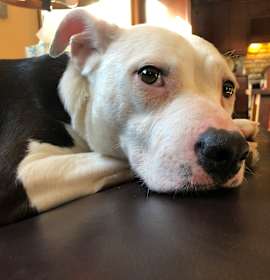
Penny
American Pit Bull Terrier Mutt
Female, adult
Westerville, OH
Not good with dogs
Not good with cats
House-trained
Spayed or Neutered
Shots are up-to-date
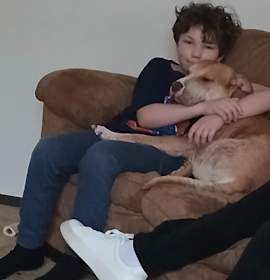
Lucky
Mutt Labrador Retriever
Male, adult
Westerville, OH
Good with dogs
Not good with cats
House-trained

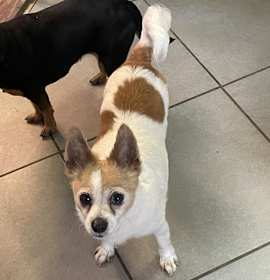
Reddy
Chihuahua Papillon
Male, 9 yrs
Westerville, OH
Not good with dogs
Not good with cats
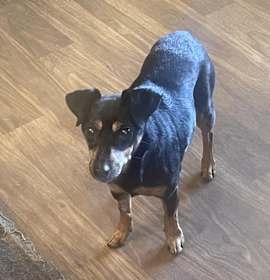
Mini
Miniature Pinscher
Female, 8 yrs
Westerville, OH
Good with dogs
Good with cats
House-trained
Spayed or Neutered
Shots are up-to-date

Barry
Shih Tzu Bichon Frise
Male, 5 yrs 9 mos
Westerville, OH
Not good with dogs
Not good with cats
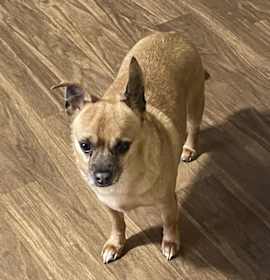
Buddy
Chihuahua
Male, 2 yrs
Westerville, OH
Good with dogs
Not good with cats
Needs experienced adopter
House-trained
Spayed or Neutered
Shots are up-to-date
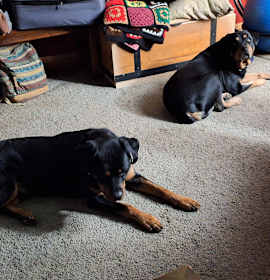
Henry and Raaz
Rottweiler
Male, adult
Westerville, OH
Not good with dogs
Not good with cats
Needs experienced adopter
House-trained
Spayed or Neutered

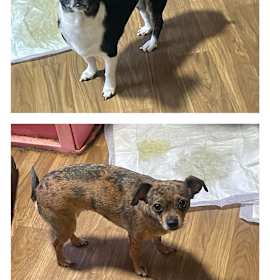
Lily & Daizy
Chihuahua
Female, 2 yrs
Westerville, OH
Good with dogs
Not good with cats
House-trained
Spayed or Neutered
Shots are up-to-date

Penny
American Pit Bull Terrier Mutt
Female, adult
Westerville, OH
Not good with dogs
Not good with cats
House-trained
Spayed or Neutered
Shots are up-to-date

Lucky
Mutt Labrador Retriever
Male, adult
Westerville, OH
Good with dogs
Not good with cats
House-trained


Reddy
Chihuahua Papillon
Male, 9 yrs
Westerville, OH
Not good with dogs
Not good with cats

Mini
Miniature Pinscher
Female, 8 yrs
Westerville, OH
Good with dogs
Good with cats
House-trained
Spayed or Neutered
Shots are up-to-date

Barry
Shih Tzu Bichon Frise
Male, 5 yrs 9 mos
Westerville, OH
Not good with dogs
Not good with cats

Buddy
Chihuahua
Male, 2 yrs
Westerville, OH
Good with dogs
Not good with cats
Needs experienced adopter
House-trained
Spayed or Neutered
Shots are up-to-date







